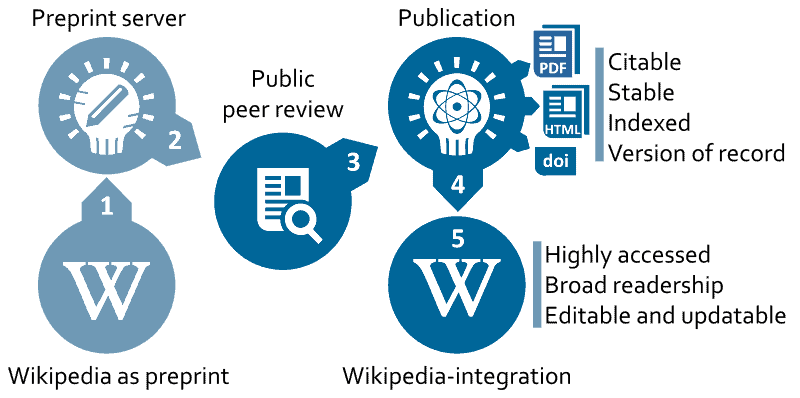- Profile
- Comments 0
- prev
- next
- Website
- Leave a comment
- prev
- next
In a nutshell
The three WikiJournals (Medicine, Science and Humanities) are Wikipedia-integrated academic journals. This firstly means that in addition to research articles, they also publish Wikipedia-style encyclopedic review articles. These review articles can be written from scratch or based on Wikipedia articles, and can be integrated back into Wikipedia after peer review. Secondly, the WikiJournals are hosted and supported by the Wikimedia Foundation and so are free to both authors and to readers. And third, the WikiJournals use the same MediaWiki software as Wikipedia. Articles automatically benefit from features like version control and discussion pages, and anyone can contribute to them, including the peer reviewers, and the journals' academic editors.
Goals and intentions
The main original goal of WikiJournals is to encourage and recognize contributions to Wikipedia by academics. To do this, the WikiJournals allow Wikipedia articles to have named authors, DOIs, a stable PDF version of record, and to undergo academic peer review. Moreover, WikiJournals strive to achieve a broad thematic scope that covers practically all fields of research, and to provide a zero cost, open access publishing venue for the fields that lack one. And finally, WikiJournals implement recognized best practices, in particular a form of open peer review where not only the reviews are made public, but also anyone can contribute.
Project status
Types of outputs
Review process
-
Review requested byNon-authors
-
Reviewer selected byEditor, service, or community
-
Public interactionYes
-
Author responseYes
-
DecisionBinary decision
Review policy
-
Review coverageComplete paper
-
Reviewer identity known toEditor or service
-
Competing interestsChecked
Review features
-
Manuscript hostingYes
-
Notes
Thanks to the MediaWiki platform, peer review at WikiJournals is extremely flexible. While comments themselves are always made public, the authors, reviewers and other participants may be named, pseudonymous or anonymous. Interactions between all the participants are possible before, during and after the review process. Reviewers may choose to perform small corrections themselves, rather than suggesting them to authors. And authors are able to revert modifications thanks to version control.
-
Eligible reviewers/editorsEditors are selected for their professional credentials as researchers, their experience with academic publishing, and their experience with open projects and in particular Wikipedia. Reviewers are selected for their status as experts in the reviewed article's subject matter. As in Wikipedia, anyone is eligible to comment: it is not even necessary to create an account.
-
Criteria for inclusion
Articles are accepted for publication (inc, PDF, doi, indexing etc) once they have been been assessed by at least two external peer reviewers (invited by the editorial board) and their responses and edits have been agreed to by both the peer reviewers and editorial board. Suitable material is integrated into Wikipedia, as a 'living version' where it is available for post-publication review and freely editable by anyone.
-
Explanation of costAll editors are currently volunteers, hosting costs supported by Wikimedia Foundation
Results
-
Number of scholarly outputs commented on10-100
-
MetricsCurrently tracked are: The number of times that an article is read in the journal and on Wikipedia (for those integrated into Wikipedia); Number of pre-publication peer reviewers; Post-publication peer review; The Social media impact of each article by AltMetric.com. Later, an impact factor will be sought by ISI Web of Science.
-
Results summary
As of 2019:
49 submitted articles, 36 accepted for publication, 12 declined, 1 withdrawn.25 currently in review.
Of the 36 published, 27 integrated into Wikipedia (of which 8 were adapted by updating/overhauling existing Wikipedia content). .
Mean number of external peer reviewers = 3.1 per article, additional suggestions from editors = 1.2 per article, spontaneous pre-publication suggestions from readers = 0.1 per article.
Extensive post-publication commentary performed on 'living' Wikipedia versions of articles.
75% of peer reviewers choose to have their identity open.
WikiJournal articles integrated in full or part into Wikipedia receive 6.9 million views per annum so far.
Combined citations 121 per G-scholar.
Combined AltMetric score >200.


Add a comment